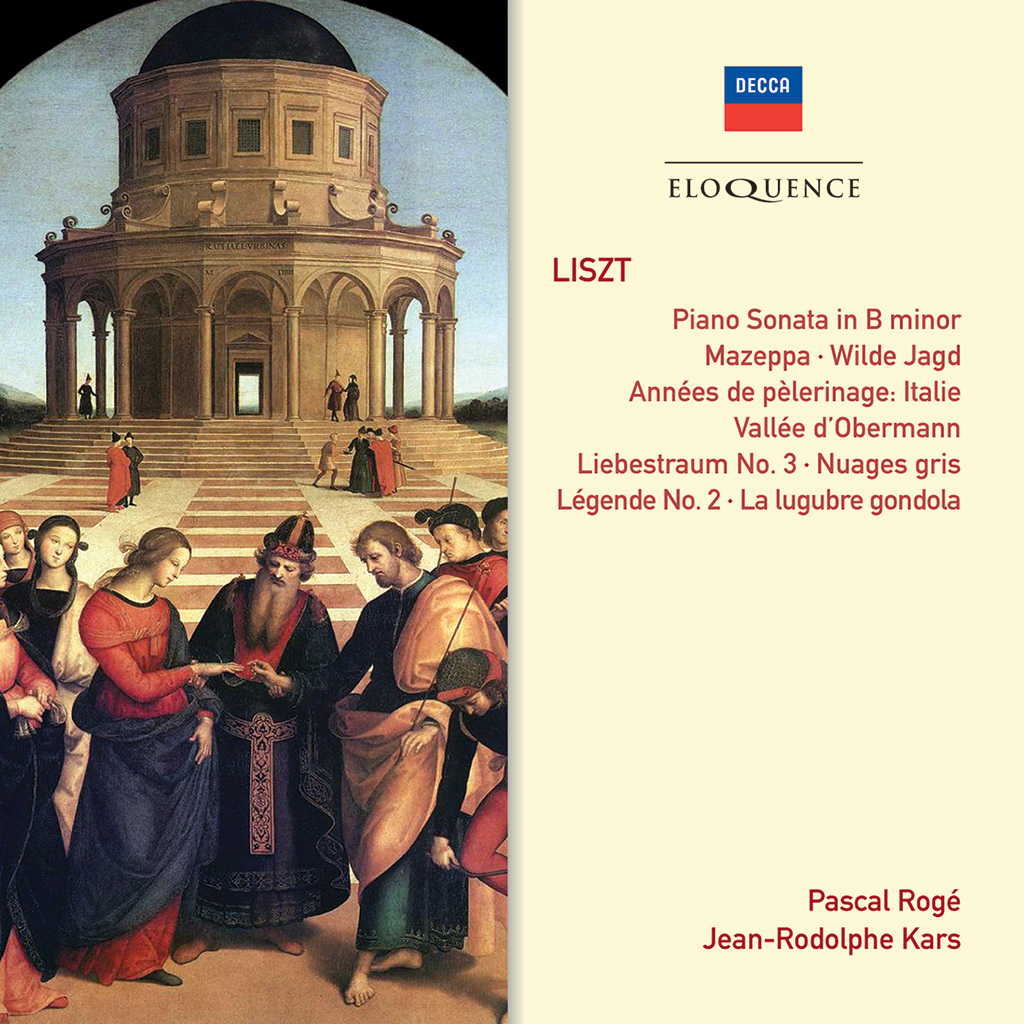Two pupils of the great Julius Katchen are featured in the piano music of Liszt on this 2CD set. Pascal Rogé was eighteen years old when he recorded the Liszt Piano Sonata, ‘Mazeppa’, ‘Vallée d’Obermann’ and the third ‘Liebestraum’ in London in December, 1969. It was during the 1967 International Competition Georges Enesco that Rogé was first discovered. He was sixteen, the only Frenchman to reach the finals, and he won a prize even though he was the youngest competitor. In Paris, where he was unanimously awarded First Prize for the Piano at the Conservatoire (in Lucette Descaves’s class) when he gave his first recital, ‘Le Figaro’ wrote:
‘… Here is an exceptional personality and already much more than a hope: a gold mine’. The ‘International Herald Tribune’ praised him with these words: ‘… his remarkable technical prowess, but also style and ability to draw his audience into his line of focus and hold it there. Such a quality is the sign of a true artist.’ Twelve years later, in 1980, he made another Liszt recording for Decca, this time of the Italian volume of ‘Années de Pèlerinage’. Both recordings are issued as part of this 2CD set, completed with Liszt recordings of both flamboyant pieces – the transcendental study ‘Wilde Jagd’, the second Legend ‘St. Francis of Paul walking on the waves’ – as well as the intimate, almost experimental late works. Born in Calcutta, India, of Viennese-Jewish parents, raised in considerable poverty, Jean-Rodolphe Kars was much admired in pianistic circles. Although his upbringing had been that of a secular Jew, he converted, in 1976, to Catholicism and was baptised in 1977. Mysteriously, in 1981, he put an end to his career as a pianist, entering the priesthood in 1986.
All these recordings appear internationally on Decca CD for the first time.
FRANZ LISZT
Piano Sonata in B minor, S.178
Études d’exécution transendante, S.139: No. 4 in D minor: Mazeppa
Années de pèlerinage – Première année: Suisse, S.160, No. 6: Vallée d’Obermann
Liebestraum No. 3 in A flat major, S.541 No. 3
Années de pèlerinage – Deuxième année: Italie, S.161
Pascal Rogé, piano
Klavierstuck No. 2 in A flat major
Nuages gris, S.199
La lugubre gondola, S.200 No. 1
Légende, S.175 No. 2 ‘St François de Paule marchant sur les flots’
Études d’exécution transendante, S.139: No. 8 in C minor: Wilde Jagd
Jean-Rodolphe Kars, piano
FIRST INTERNATIONAL RELEASE ON CD
Recording Producers: Michael Woolcock (Sonata, Mazeppa, Vallée d’Obermann, Liebestraum); Erik Smith (Légende, Wilde Jagd, Klavierstuck No. 2, Nuages gris, La lugubre gondola); Andrew Cornall (Années de pèlerinage: Italie)
Balance Engineers: James Lock, Tryggvi Tryggvason (Sonata, Mazeppa, Vallée d’Obermann, Liebestraum); Alec Rosner (Légende, Wilde Jagd, Klavierstuck No. 2, Nuages gris, La lugubre gondola); John Pellowe, John Dunkerley (Années de pèlerinage: Italie)
Recording Locations: Decca Studio 3, West Hampstead, London, UK, July 1968 (Légende, Wilde Jagd, Klavierstuck No. 2, Nuages gris, La lugubre gondola); Kingsway Hall, London, UK, December 1969 (Sonata, Mazeppa, Vallée d’Obermann, Liebestraum), March 1980 (Années de pèlerinage: Italie)
‘There are so many super-pianists about nowadays that no boy or girl is likely to make the grade without being able to rattle off Liszt’s B minor Sonata faultlessly at the age of 18. The point is how well? Pascal Rogé was 18 when he made this record last December: he can not only play this transcendentally difficult sonata, he gives it one of the most intelligent and Sensitive interpretations anybody could hope to hear.’ Gramophone
‘He attains a remarkably sustained intensity with some pages [of the ‘Dante’ Sonata] and the whole is extremely well integrated’ (Années de Pèlerinage) Gramophone
‘instead of storming classical heights with jejune interpretations, [this recital disc] is content to offer evidence of pianistic virtuosity, musical sensitivity and an interest in music going beyond the reachme-downs of the standard repertoire … The pieces and playing make the record very desirable (Kars) Gramophone

